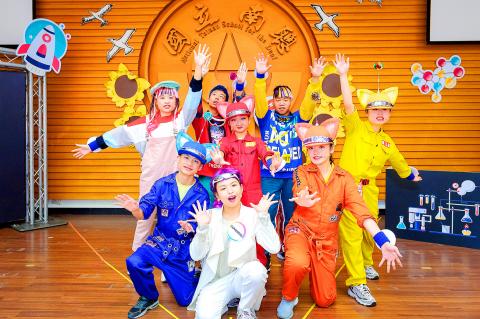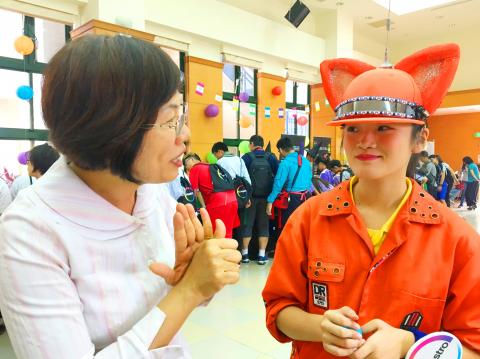“Sometimes when I go out, I deliberately take off my hearing aid because I do not want other people to stare at me because of it,” senior-high school student Fu Hsin-hsi (傅信熹) said.
Fu, who has a mild hearing impairment, was surprisingly energetic as one of the Taipei School for the Hearing Impaired students performing on Friday at the Affiliated School for Students with Hearing Impairments of National University of Tainan in a play about a group of science enthusiasts’ adventures.
Other performers have more serious hearing impairments or rare disorders, such as Kabuki syndrome, and have to rely on teachers’ help to communicate with others.

Photo: Courtesy of Covestro Taiwan
The performance is part of Covestro Taiwan’s corporate social responsibility project to promote science at the nation’s three schools for the hearing-impaired, which each offering preschool, elementary, junior-high and senior-high programs.
The Taipei school has 136 students, the Tainan school has 168 and the Taichung school has 259, including some with intellectual disabilities, Ministry of Education data as of last month showed.
Polymer supplier Covestro commissioned Godot Theatre Company (果陀劇場) director Joyce Tsai (蔡櫻茹) to direct the production.

Photo: Lin Chia-nan, Taipei Times
Tsai said she pushed her performers to memorize their lines and told teachers not to give them cues during performances, even though it takes more time for the students to understand her instructions.
Her aim is to bring her student performers closer to ordinary audiences and help them become more independent, but she had to make adjustments at times to make the show presentable, she said.
For example, she moved Fu from the back row in a dance number to the front row a few days before the performance, because Fu appeared to have a better sense of rhythm when dancing, Tsai said.
The principal of Sanwei Elementary School in Kaohsiung, Tseng Po-chien (曾博建), changed his school’s exam schedule so his pupils could see the show.
Tseng said he was deeply moved watching the performance, which he thought would be challenging for hearing-able students.
As part of the event, Covestro also organized scientific games, including one on the “Cheerios effect,” which was demonstrated by a team of junior-high students from the Taichung school.
Game participants must put a pin and a wooden piece at designated points on the surface of a container of water.
It was interesting to guide visitors to conduct the experiment, which they could only succeed at after learning the secret from them, student demonstrator Wu Shang-tse (吳尚澤) said.
While the students had received training with the school’s science club that Covestro helped establish in March, they had to demonstrate the experiment to their audience using sign and spoken language, challenging for them because their speaking capabilities vary with their hearing levels, said Hsiao Ming-hua (蕭明華), who is secretary to the Taichung school’s principal, Lin Li-jung (林麗容).
Students at the Taichung school face a variety of learning barriers, and the job of their teachers is to guide them to overcome the barriers according to their individual aptitudes, said National Taichung University of Education (NTCU) student Chen Wen-ling (陳玟伶), who is the science club’s instructor.
People with limited hearing often pay closer attention to a speaker’s facial expressions, which actually contain many messages, and thus they are more sensitive to other people’s emotions, she said.
There is no universal definition of what a “good teacher” should be like, given that some care about grades while others value students’ integrity, she said, adding that any teacher who can help students make progress one way or another could be seen as a good one.
Hsu Liang-rong (許良榮), a professor at the NTCU science education and application department and Chen’s mentor, who helped design the scientific experiments used for Friday’s event, said he had not had contact with hearing-impaired students before starting to work with the Covestro project.
Schools for the hearing-impaired often lack qualified science teachers, and therefore he shares his experiment designs with them to help encourage an interest in science among their students, Hsu said.
The experiments he designs use readily accessible materials instead of expensive devices, he said.
Lin said she had been impressed by the expression on the students’ faces when they saw the science experiments, adding that such activities not only help them to improve their scientific knowledge, but aid in developing their self-esteem.
With the number of students at her school falling as the nation’s birthrate has dropped, the school hopes to develop a distinguishing feature, she said, adding that it plans to promote science education by seeking funding from the Taichung City Government.
Her school helps its senior-high students pursue higher education or enter the workforce upon graduation, based on the desires of the students and their parents, Lin added.
Friday’s event was organized by Covestro Taiwan communications manager Renee Chen (陳郅華), who said she is more sympathetic to hearing-impaired students and others who face challenges because her own daughters have struggled to overcome developmental delays.
Thanks to early intervention treatment and an interest in English-language storybooks, her daughters’ academic performances have become better than average, she said, adding she was delighted to see the hearing-impaired students feeling a sense of achievement by performing or taking part in the games.
“A nation’s special education is an epitome of its overall education conditions,” said Liao Ting-li (廖婷俐), who teaches at the Taipei school, adding that she has loved working with disadvantaged students over the past 30 years.
A second performance and round of science games is to take place at the Taipei School for the Hearing Impaired this Friday.

CAUTION: Based on intelligence from the nation’s security agencies, MOFA has cautioned Taiwanese travelers about heightened safety risks in China-friendly countries The Ministry of Foreign Affairs (MOFA) yesterday urged Taiwanese to be aware of their safety when traveling abroad, especially in countries that are friendly to China. China in June last year issued 22 guidelines that allow its courts to try in absentia and sentence to death so-called “diehard” Taiwanese independence activists, even though Chinese courts have no jurisdiction in Taiwan. Late last month, a senior Chinese official gave closed-door instructions to state security units to implement the guidelines in countries friendly to China, a government memo and a senior Taiwan security official said, based on information gathered by Taiwan’s intelligence agency. The

The National Immigration Agency (NIA) said yesterday that it will revoke the dependent-based residence permit of a Chinese social media influencer who reportedly “openly advocated for [China’s] unification through military force” with Taiwan. The Chinese national, identified by her surname Liu (劉), will have her residence permit revoked in accordance with Article 14 of the “Measures for the permission of family- based residence, long-term residence and settlement of people from the Mainland Area in the Taiwan Area,” the NIA said in a news release. The agency explained it received reports that Liu made “unifying Taiwan through military force” statements on her online

Taiwan Semiconductor Manufacturing Co (TSMC), the world’s largest contract chipmaker, said yesterday that it is looking to hire 8,000 people this year, at a time when the tech giant is expanding production capacity to maintain its lead over competitors. To attract talent, TSMC would launch a large-scale recruitment campaign on campuses across Taiwan, where a newly recruited engineer with a master’s degree could expect to receive an average salary of NT$2.2 million (US$60,912), which is much higher than the 2023 national average of NT$709,000 for those in the same category, according to government statistics. TSMC, which accounted for more than 60 percent

Tung Tzu-hsien (童子賢), a Taiwanese businessman and deputy convener of the nation’s National Climate Change Committee, said yesterday that “electrical power is national power” and nuclear energy is “very important to Taiwan.” Tung made the remarks, suggesting that his views do not align with the country’s current official policy of phasing out nuclear energy, at a forum organized by the Taiwan People’s Party titled “Challenges and Prospects of Taiwan’s AI Industry and Energy Policy.” “Taiwan is currently pursuing industries with high added- value and is developing vigorously, and this all requires electricity,” said the chairman